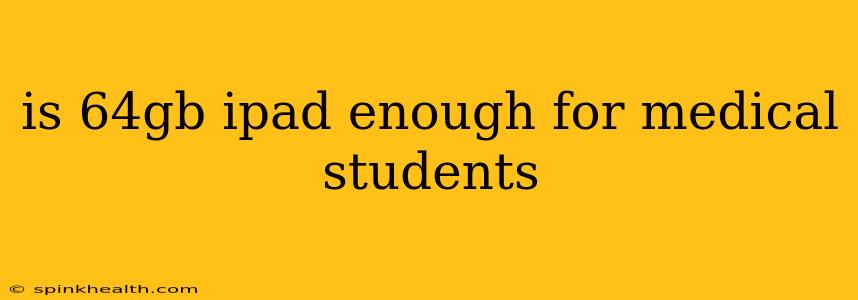Is 64GB of iPad Storage Enough for Medical Students? A Doctor's Perspective
The world of medical school is a whirlwind of lectures, labs, textbooks, and, of course, an ever-growing mountain of digital information. So, the question on many aspiring doctors' minds is: Is a 64GB iPad enough to handle the demands of medical education? The short answer is…maybe. It depends heavily on your usage habits and how you manage your digital files. Let me share my experience as a practicing physician and technology enthusiast to help you navigate this crucial decision.
My journey through medical school felt like a constant battle against storage limitations. Back then, we didn't have the cloud storage options readily available today. I remember lugging around heavy textbooks and frantically deleting files to make space for new lectures. The frustration was real! But times have changed.
Let's dive into some key considerations:
What factors determine iPad storage needs for medical students?
This is a critical point that often gets overlooked. The actual storage requirement isn't just about the raw gigabytes but also about your personal usage habits.
-
How do you prefer to learn? Are you someone who prefers digital textbooks and notes over physical copies? Do you download many videos or rely mainly on streaming services? The more digital content you consume, the more storage you will need.
-
What apps do you plan to use? Medical apps can be surprisingly large, especially those with extensive image libraries or offline functionality. Consider the apps you'll rely on for anatomy study, pharmacology, or clinical reference.
-
How do you manage your files? Cloud storage services like iCloud, Google Drive, or Dropbox are your best friends in this situation. Regularly backing up your files to the cloud frees up significant space on your iPad.
What about downloading textbooks and other large files?
This is a major concern for many students. While some textbooks offer smaller digital versions, many are quite large. 64GB might quickly fill up if you are planning to download an extensive library of eBooks. Consider whether you can access textbooks online or through your institution's library system instead of downloading them.
Can I use cloud storage to compensate for limited iPad storage?
Absolutely! Cloud storage is your saving grace. Services like iCloud, Google Drive, and Dropbox allow you to store files online, accessing them whenever you have an internet connection. While this works well for many files, remember that you'll need a reliable internet connection to access these resources, which might be a challenge depending on your location.
Are there alternative options beyond a 64GB iPad?
Yes, of course! While a 64GB iPad might be enough with careful planning, consider investing in a larger storage capacity if your budget allows. A 128GB or 256GB iPad will provide significantly more peace of mind, especially during the demanding years of medical school. Alternatively, explore using an iPad alongside a laptop or desktop computer for tasks requiring extensive storage space.
What are some storage-saving tips for medical students?
Here are some practical tips to maximize your iPad's limited storage capacity:
- Delete unnecessary apps: Regularly review your apps and uninstall those you no longer use.
- Compress images and videos: Use compression tools to reduce the file size of media without significant quality loss.
- Use cloud storage: Regularly back up and store your files in the cloud to free up space on your device.
- Take advantage of your institution's resources: Many medical schools offer online access to textbooks and other resources.
Conclusion:
A 64GB iPad could work for medical school, but it requires diligent management of your digital files and a willingness to embrace cloud storage. For the sake of your sanity and efficiency, I highly recommend considering a larger storage capacity if your budget allows. The investment will pay off in reduced stress and increased productivity during your demanding medical school journey. Remember, your success in medical school doesn't depend solely on your tech, but thoughtful planning and the right tools definitely make a difference.

